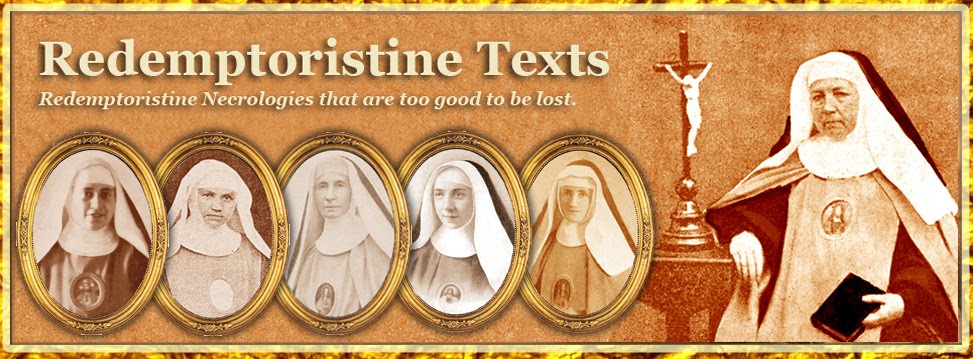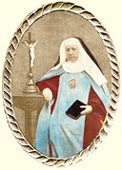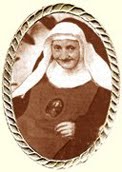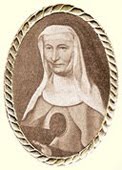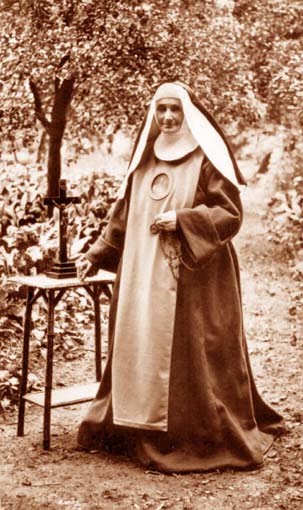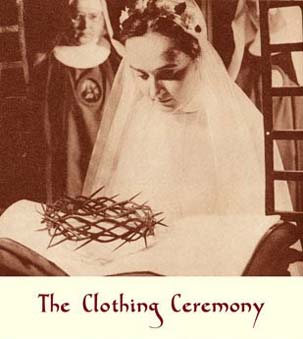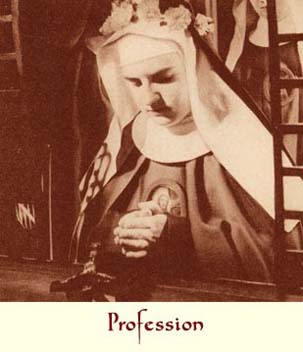Chapter X.
The Superior. - Her Government, her Charity, her Patience.
Her last Illness, her last Teachings.
The Superior. - Her Government, her Charity, her Patience.
Her last Illness, her last Teachings.
Mother Mary-Aloyse never governed her Monastery according to her own views, but in conformity with the spirit of Saint Alphonsus. The prescriptions of the Rule laid down by the holy Doctor, the teachings enclosed in his books, the instructions left behind by his best disciples, all dictated the manner in which she should act. And so she liked to remind her daughters of the solid exhortations addressed to the Community in 1842-1843 by Fathers Joseph and Paul Reyners, and most especially by the Venerable Father Joseph Passerat during the two years that he spent at Bruges (1848-1850). The numerous notes taken down by her or by the Sisters made this work easier for her, and this was how she was able to maintain this traditional spirit of regular observance in her Monastery, and the apostolic zeal of which we have already spoken.
She also liked to inculcate the practice of the twelve principal virtues, a practice that was special to her Institute. She even composed a very useful little work concerning these twelve virtues, using the teachings of the Ven. Father Passerat. The love of Our Lord is its soul, and she shows perfectly how religious who work in this way for their perfection can give a wonderful aid to the work of the missionaries.
A religious who knew her well has left us some very instructive details on the venerable Superior’s manner of action. “She would most willingly speak of the little habitual mortifications. They win the heart of God.” she said. She also said, “N (she quoted her secular name) should obey Sister Mary N (her name in religion).” In other words, nature should obey grace.
“While severe on herself, she would not allow her Sisters to lack necessities.
“When conversing with people, she was very spiritual and private, giving her opinions according to the advice she had received from the Venerable Father Passerat and other fervent Redemptorists.
“She was truly a mother to the sick and ill. She worried on their behalf during the night, always seeking to procure them some comfort. In the morning, for example, when she went to see them, she would say, “I was thinking last night about something that would help you. I have sent someone out to buy it... Try it.”
“One of the Sisters who was sick wanted to have exactly the same food as the rest of the community. The Reverend Mother did not wish to contradict her, but one day she said to her, “I would so much like to look after the Child Jesus, but He doesn’t want me to.” - “The Child Jesus would like it a lot,” replied the invalid. “The Child Jesus is you, my good Sister!” and the sick nun accepted her care. The Reverend Mother’s face immediately lit up with joy, and she ran off to find the infirmarian and the dispenser, telling them, “She has accepted our care.” And she would immediately lavish her maternal care on her.
Her charity towards her neighbour was also full of thoughtfulness. Towards her religious family she would show herself to be the most tender of mothers. Towards her family who were left in the world, she was always full of kindness and attention. Her sister-in-law died at the age of forty six, leaving seven children of whom two were under age. She wrote the most affectionate letters to her brother to support him in this terrible trial, and gave him her best advice for the education of his children. Her brother died in his turn, and she had as it were a presentiment of it. During his last visit, he was in very good health, but after he departed, she went to see Mother Mary-Philomena and told her. “I shall never see Victor again.” Six weeks afterwards, he died of a stroke. After his death, Mother Mary-Aloyse let slip to her Superior, “I saw his soul in Purgatory.”
Her charity towards the Congregation was affirmed chiefly in her generosity towards the house at Beauplateau, which was the house of study for the Belgian Province. Nothing much mattered to her from the time she decided to support this foundation, which she quite rightly regarded as a nursery for missionaries and apostles. The Most Rev. Father Kockerols wrote to her one day about it. “You have lost your vocation. Your royal generosity seems to indicate that you have a vocation as queen. I prefer, however, to see you as the poor little daughter of Saint Alphonsus on earth, and queen in heaven.”
It is time to speak about her patience in illnesses. Ingenious at hiding her sufferings, she never appeared so jolly as in the moments when some illness troubled her. Two years before her death she felt the first symptoms of the illness which was to carry her off. She only spoke about it when the pain had become insupportable. Then she went down to the ground floor, into the room where she usually stayed. Every day she took holy communion, and every day everyone could admire her heroic patience. She never said a word about her sufferings, or she only spoke of them through obedience. She was always attentive to her neighbour’s needs, and worried unceasingly about her Sisters, and listened to them one by one in spite of her own fatigue, giving them her best advice. This is how her last teachings were recorded, from 17th October to 12th December 1889. We shall cite a part of them here. Better than anything we have said, they typify and show the spirit which inspired this fervent religious. We shall group them under certain headings to give them maximum impact.
I. The Love of Jesus Christ. - The cross.
1. “Love our good Jesus. He is always adorable, even when He comes with the Cross, even when it hurts. Always do His will. Do not ask for sufferings, but accept those He sends you. We are not sure of having grace for those we ask for, but we certainly are for those He gives us. For in them there is nothing of ourselves.”
2. The apostolic virtue of suffering. - If we are truly on the Cross, then we are with Our Lord, so we have nothing to complain of. Everything for You, my God, for the salvation of souls, and there are still so many of them to save; for the conversion of sinners, the deliverance and relief of souls in Purgatory, for the Community, the Congregation, my family, and the holy Church. My God, whatever You want, for as long as You want it, my God, help me, rescue me, and give me Your patience.”
The suffering and Passion of Jesus Christ. - Night and day, she followed Our Lord in His Passion and joined herself to the sorrows of the most holy Virgin. She said, “We must accept our sufferings without consolation, but with love. It is so good to just simply look at Our Lord on the cross, and rest our own souls in His! Just remain at the foot of the Cross and rest in the heart of Our Lord. Look at Him with the eyes of the soul, without saying anything. Get into the habit of it, and you will see, whenever you are ill, how useful it will be to you.
It is better to have ten crosses than just one alone.
“How good it is to be at the foot of the Cross, so that the Precious Blood of Our Lord may fall upon us, wash us and drench us! Ordinarily, after holy communion, I draw from the wounds of Our Lord. Today I said, “My God, I do not know how much to take, so let You Yourself give me what I should have. Perhaps I do not take enough from Your wounds, or perhaps I take what I shouldn’t have. Plunge me into Your precious blood.” And then she added, “This is where I should be.”
“We should always act with a view to pleasing Our Lord. You will find in Him the strength necessary to do your duties and sanctify yourselves.
“Forget about yourselves by thinking of Jesus Christ. He is the one true good. All the rest is folly and vanity.
“It is good to suffer for Jesus Christ.
“Our souls are very beautiful, but Our Lord makes them far more beautiful still through the graces He grants us. How great His mercy is! Misericordias Domini in aeternum cantabo (I shall sing of the mercies of the Lord in eternity).
“Give Our Lord nothing by halves. Be generous, and He will be the same with you.”
II. Will of God.
“Heaven on earth is when you do the will of God.
“You do not need just submission, but conformity with the will of God. Learn to understand the difference.”
III. Sufferings.
It is a great grace to suffer. Sufferings are of an incalculable and inestimable value. Our good God has created a very great miracle by giving me the patience to be cured by them.
The doctor wanted to give her a sedative to relieve her pain, but she said, “You want to take away my treasure.”
After passing a night without suffering, she said, “I have passed the night like an animal, just sleeping and drinking.” It was only a little drop of milk!
“Poor Mother!” someone once said to her. She replied, “It’s better to say “Happy Mother” because I have nothing to complain of.
“Sufferings are worth more than consolations, for there are no illusions possible in them. Crosses are graces.
IV. Love of God.
She often said, “Ask our good God to let me love Him perfectly before I die.”
“Refuse nothing to God. Give Him immediately what He asks of you. Then He will also give you what you ask of Him. He is making me wait before He gives me His wonderful Paradise, and that is to punish me for making Him wait when He asked me for a small sacrifice or some small act.
“When she was seized by a choking fit, she said, “My God, I’m choking. Let me choke with love.”
At every new suffering, she said, “Thank you, my God, thank you. Give me patience. For as long as You want, my God. Fiat! Fiat! (Let it be. Let it be!).
“When you have the occasion to make a little sacrifice, an act which costs you, say, “For You, my God!” Then, do not think of it again, as our nature easily slips in our acts without our knowing it, and makes us lose the merit from what we have just done. So say with Saint Paul, “I know whom I have entrusted my treasure to, so it will not be taken from me.”
“I have always spoken to our good God and the most holy Virgin as a child to her father and mother. I have asked them to help me with everything, to solve a problem, do a job, and other things of this kind. I have always been looked after.
V. Obedience. - Poverty. - Detachment.
“Obedience to your confessor and confidence in him are a source of peace.
“Put obedience above everything” she said on the eve of her death. Seek after God, and you will find Him, if you put something else before Him, you will never find Him.”
She loved poverty and she greatly loved the poor. When she noticed them putting the milk she was taking into the ice-box one day, she asked them to give the poor the money for the ice and said:
“Our Lord would like it, and I too would be happier than if I had iced milk to drink.”
One day she said to her niece, a religious in the Monastery, “The Venerable Father Passerat used to say, “When we do not think of the person we loved and have now lost, but rather of our good God, this sacrifice is so agreeable to Him that He brings this person straight to Paradise. I did this for my own father, and he was looked after. Try to do this for me.”
VI. Jesus and Mary.
“Love Jesus and Mary. This is everything.
“A blessing by the Most Holy Sacrament is so very precious! Never miss out on one voluntarily, or a Mass. - Go to Mass for me, I beg you.
“What a happiness it is for us to be able to communicate so often. Ask this evening not to lose any of the graces that God will grant you tomorrow.
“How good God is to me! It is two months now since I was able to swallow a piece of bread, but I have no trouble with the sacred Host. I can take nothing except what comes from God and (indicating the water from Lourdes) from the most holy Virgin.”
To satisfy her devotion to the Most Holy Sacrament, she greatly loved to hear them singing the Adoro te (Devoutly I adore thee, hidden Deity). One day when they sang it in the community room, which was right next to her own, she could not keep herself from weeping, and cried out during the last verse, Jesu, quem velatum nunc aspicio, (Oh Jesus, Thou whom veiled I now behold) “Ah, Lord, You are too good to me. I am not worthy.” And she told her nurse, “Tell the Sisters that I am praying to Our Lord to grant them the same number of graces as the delights I had during this wonderful song.”
“Oh how nice it is to die when we have often said to the Holy Virgin during our lifetime, “Pray for us at the hour of our death.”
VII. Christian death.
Sursum corda! (Lift up your hearts!). “Do everything for our good God. At death, this is all that remains. All the rest is lost.
*
* *
“Death does not separate us, but makes us arrive at our end. One before, the other after.
*
* *
“When we seek only for God during our lives, He shows Himself to us at our death.
*
* *
“At death, everything disappears. All that remains is confidence in God and in the merits of Jesus Christ.
*
* *
She often liked to repeat either one verse from the Psalms or another. Sometimes she also sang the Adoro te, especially the last verse, or the Magnificat or the Laudate (Praise Him), and would say, “This is how I keep myself going. When you’ve done it all your life, you do it easily when you’re dying.”
*
* *
She clasped the little crucifix that she always held in her hand closely to her heart, and looked at it affectionately and said, “Oh, how true it is what Saint Alphonsus used to say to his own crucifix, “When all the others abandon me at the hour of death, You alone will remain with me, my Lord.” In fact, everyone else is powerless to help me, but my Jesus, who alone remains with me, gives me strength, help and consolation.” When she said this, she lovingly kissed the image of her Saviour.
To a Sister who was having trouble making the sacrifice of her Superior, she said one day:
“Always have God before your eyes, do everything for God alone, and, at the hour of your death, you will find God alone, whom you have sought. Attach yourself only to God, only to Jesus, and think only of loving Him, knowing Him and imitating Him. The imitation of Jesus Christ includes all the duties of a good Redemptoristine. In your pains, think of the pains of Our Lord. When you have certain desires to overcome, tell yourself, “Jesus did not have this. All He sought was humiliation.” And at the hour of death, what is all this anyway? Everything disappears.”
VIII. The Redemptoristine.
During their good Mother’s illness, the Redemptoristines of Bruges did not wish to lose their custom of asking her every evening for her blessing. The pious invalid would address some words of edification to them. We are citing some of them to complete the moral portrait of this true Redemptoristine.
“Always have recourse to the Sacred Heart of Jesus,” she told them one day. “Go to Him. You must ask Him for everything through the Heart of Mary, as it is through the Heart of Mary that we will obtain everything.
“Ask God Himself to teach you the art of loving Him. How did He love? Look at Jesus crucified. He gives everything, sacrifices Himself and forgets Himself.”
On 8th December, she made up this beautiful prayer, “Oh Mary conceived without sin, pray for us who have recourse to you. Preserve them all in your love and in the love of Jesus Christ. They are all your children. May Mary Immaculate bless you and preserve you all pure, and may this fine day end for me in heaven!”
As a faithful disciple of Saint Alphonsus, she could not fail to speak of her blessed Father. She did this on several occasions, and in a remarkable fashion:
“Remain always,” she said one day to her daughters, “remain always faithful to the teachings of our Fathers and the doctrine of Saint Alphonsus. This is our own way to perfection. If you go by another, you will never arrive there.”
“I believe,” she said one day, “I believe that God is granting me so many graces at my death because I have always loved Saint Alphonsus and his works.”
She also said, “Avoid devotions which are not founded on the teachings of Saint Alphonsus.”
“I am dying as a submissive and grateful daughter of the Most Reverend Father General, the representative of Saint Alphonsus.” We saw in the letters that the Most Reverend Father Mauron addressed to her how truly devoted she was to the works of the holy Doctor.
She also reminded her daughters of the end that they must unceasingly have before their eyes:
“Always bring everything back to the salvation of souls. This is our vocation.” And when she had received the last sacraments, she indicated, for the last time, this sublime end of approaching in a compelling manner the silence of Calvary and the silence of the life of a Redemptoristine:
“Live completely tranquil at the foot of the Cross. The great work of Redemption works in a profound silence. Jesus communicates with his heavenly Father without saying a word. Nobody notices what is happening, not a single word is heard aloud, and yet the Redemption is accomplished, and souls are ransomed and saved. Mary, at the foot of the Cross, keeps the same silence. She unites herself to the sentiments and intentions of Jesus, and this is all. Do the same. Ask what Jesus Christ asks. Offer what He offers. Desire what He desires. Enter, in other words, into His Heart, and contribute by the sacrifice of yourselves to the salvation of the world.”
She also liked to inculcate the practice of the twelve principal virtues, a practice that was special to her Institute. She even composed a very useful little work concerning these twelve virtues, using the teachings of the Ven. Father Passerat. The love of Our Lord is its soul, and she shows perfectly how religious who work in this way for their perfection can give a wonderful aid to the work of the missionaries.
A religious who knew her well has left us some very instructive details on the venerable Superior’s manner of action. “She would most willingly speak of the little habitual mortifications. They win the heart of God.” she said. She also said, “N (she quoted her secular name) should obey Sister Mary N (her name in religion).” In other words, nature should obey grace.
“While severe on herself, she would not allow her Sisters to lack necessities.
“When conversing with people, she was very spiritual and private, giving her opinions according to the advice she had received from the Venerable Father Passerat and other fervent Redemptorists.
“She was truly a mother to the sick and ill. She worried on their behalf during the night, always seeking to procure them some comfort. In the morning, for example, when she went to see them, she would say, “I was thinking last night about something that would help you. I have sent someone out to buy it... Try it.”
“One of the Sisters who was sick wanted to have exactly the same food as the rest of the community. The Reverend Mother did not wish to contradict her, but one day she said to her, “I would so much like to look after the Child Jesus, but He doesn’t want me to.” - “The Child Jesus would like it a lot,” replied the invalid. “The Child Jesus is you, my good Sister!” and the sick nun accepted her care. The Reverend Mother’s face immediately lit up with joy, and she ran off to find the infirmarian and the dispenser, telling them, “She has accepted our care.” And she would immediately lavish her maternal care on her.
Her charity towards her neighbour was also full of thoughtfulness. Towards her religious family she would show herself to be the most tender of mothers. Towards her family who were left in the world, she was always full of kindness and attention. Her sister-in-law died at the age of forty six, leaving seven children of whom two were under age. She wrote the most affectionate letters to her brother to support him in this terrible trial, and gave him her best advice for the education of his children. Her brother died in his turn, and she had as it were a presentiment of it. During his last visit, he was in very good health, but after he departed, she went to see Mother Mary-Philomena and told her. “I shall never see Victor again.” Six weeks afterwards, he died of a stroke. After his death, Mother Mary-Aloyse let slip to her Superior, “I saw his soul in Purgatory.”
Her charity towards the Congregation was affirmed chiefly in her generosity towards the house at Beauplateau, which was the house of study for the Belgian Province. Nothing much mattered to her from the time she decided to support this foundation, which she quite rightly regarded as a nursery for missionaries and apostles. The Most Rev. Father Kockerols wrote to her one day about it. “You have lost your vocation. Your royal generosity seems to indicate that you have a vocation as queen. I prefer, however, to see you as the poor little daughter of Saint Alphonsus on earth, and queen in heaven.”
It is time to speak about her patience in illnesses. Ingenious at hiding her sufferings, she never appeared so jolly as in the moments when some illness troubled her. Two years before her death she felt the first symptoms of the illness which was to carry her off. She only spoke about it when the pain had become insupportable. Then she went down to the ground floor, into the room where she usually stayed. Every day she took holy communion, and every day everyone could admire her heroic patience. She never said a word about her sufferings, or she only spoke of them through obedience. She was always attentive to her neighbour’s needs, and worried unceasingly about her Sisters, and listened to them one by one in spite of her own fatigue, giving them her best advice. This is how her last teachings were recorded, from 17th October to 12th December 1889. We shall cite a part of them here. Better than anything we have said, they typify and show the spirit which inspired this fervent religious. We shall group them under certain headings to give them maximum impact.
I. The Love of Jesus Christ. - The cross.
1. “Love our good Jesus. He is always adorable, even when He comes with the Cross, even when it hurts. Always do His will. Do not ask for sufferings, but accept those He sends you. We are not sure of having grace for those we ask for, but we certainly are for those He gives us. For in them there is nothing of ourselves.”
2. The apostolic virtue of suffering. - If we are truly on the Cross, then we are with Our Lord, so we have nothing to complain of. Everything for You, my God, for the salvation of souls, and there are still so many of them to save; for the conversion of sinners, the deliverance and relief of souls in Purgatory, for the Community, the Congregation, my family, and the holy Church. My God, whatever You want, for as long as You want it, my God, help me, rescue me, and give me Your patience.”
The suffering and Passion of Jesus Christ. - Night and day, she followed Our Lord in His Passion and joined herself to the sorrows of the most holy Virgin. She said, “We must accept our sufferings without consolation, but with love. It is so good to just simply look at Our Lord on the cross, and rest our own souls in His! Just remain at the foot of the Cross and rest in the heart of Our Lord. Look at Him with the eyes of the soul, without saying anything. Get into the habit of it, and you will see, whenever you are ill, how useful it will be to you.
It is better to have ten crosses than just one alone.
“How good it is to be at the foot of the Cross, so that the Precious Blood of Our Lord may fall upon us, wash us and drench us! Ordinarily, after holy communion, I draw from the wounds of Our Lord. Today I said, “My God, I do not know how much to take, so let You Yourself give me what I should have. Perhaps I do not take enough from Your wounds, or perhaps I take what I shouldn’t have. Plunge me into Your precious blood.” And then she added, “This is where I should be.”
“We should always act with a view to pleasing Our Lord. You will find in Him the strength necessary to do your duties and sanctify yourselves.
“Forget about yourselves by thinking of Jesus Christ. He is the one true good. All the rest is folly and vanity.
“It is good to suffer for Jesus Christ.
“Our souls are very beautiful, but Our Lord makes them far more beautiful still through the graces He grants us. How great His mercy is! Misericordias Domini in aeternum cantabo (I shall sing of the mercies of the Lord in eternity).
“Give Our Lord nothing by halves. Be generous, and He will be the same with you.”
II. Will of God.
“Heaven on earth is when you do the will of God.
“You do not need just submission, but conformity with the will of God. Learn to understand the difference.”
III. Sufferings.
It is a great grace to suffer. Sufferings are of an incalculable and inestimable value. Our good God has created a very great miracle by giving me the patience to be cured by them.
The doctor wanted to give her a sedative to relieve her pain, but she said, “You want to take away my treasure.”
After passing a night without suffering, she said, “I have passed the night like an animal, just sleeping and drinking.” It was only a little drop of milk!
“Poor Mother!” someone once said to her. She replied, “It’s better to say “Happy Mother” because I have nothing to complain of.
“Sufferings are worth more than consolations, for there are no illusions possible in them. Crosses are graces.
IV. Love of God.
She often said, “Ask our good God to let me love Him perfectly before I die.”
“Refuse nothing to God. Give Him immediately what He asks of you. Then He will also give you what you ask of Him. He is making me wait before He gives me His wonderful Paradise, and that is to punish me for making Him wait when He asked me for a small sacrifice or some small act.
“When she was seized by a choking fit, she said, “My God, I’m choking. Let me choke with love.”
At every new suffering, she said, “Thank you, my God, thank you. Give me patience. For as long as You want, my God. Fiat! Fiat! (Let it be. Let it be!).
“When you have the occasion to make a little sacrifice, an act which costs you, say, “For You, my God!” Then, do not think of it again, as our nature easily slips in our acts without our knowing it, and makes us lose the merit from what we have just done. So say with Saint Paul, “I know whom I have entrusted my treasure to, so it will not be taken from me.”
“I have always spoken to our good God and the most holy Virgin as a child to her father and mother. I have asked them to help me with everything, to solve a problem, do a job, and other things of this kind. I have always been looked after.
V. Obedience. - Poverty. - Detachment.
“Obedience to your confessor and confidence in him are a source of peace.
“Put obedience above everything” she said on the eve of her death. Seek after God, and you will find Him, if you put something else before Him, you will never find Him.”
She loved poverty and she greatly loved the poor. When she noticed them putting the milk she was taking into the ice-box one day, she asked them to give the poor the money for the ice and said:
“Our Lord would like it, and I too would be happier than if I had iced milk to drink.”
One day she said to her niece, a religious in the Monastery, “The Venerable Father Passerat used to say, “When we do not think of the person we loved and have now lost, but rather of our good God, this sacrifice is so agreeable to Him that He brings this person straight to Paradise. I did this for my own father, and he was looked after. Try to do this for me.”
VI. Jesus and Mary.
“Love Jesus and Mary. This is everything.
“A blessing by the Most Holy Sacrament is so very precious! Never miss out on one voluntarily, or a Mass. - Go to Mass for me, I beg you.
“What a happiness it is for us to be able to communicate so often. Ask this evening not to lose any of the graces that God will grant you tomorrow.
“How good God is to me! It is two months now since I was able to swallow a piece of bread, but I have no trouble with the sacred Host. I can take nothing except what comes from God and (indicating the water from Lourdes) from the most holy Virgin.”
To satisfy her devotion to the Most Holy Sacrament, she greatly loved to hear them singing the Adoro te (Devoutly I adore thee, hidden Deity). One day when they sang it in the community room, which was right next to her own, she could not keep herself from weeping, and cried out during the last verse, Jesu, quem velatum nunc aspicio, (Oh Jesus, Thou whom veiled I now behold) “Ah, Lord, You are too good to me. I am not worthy.” And she told her nurse, “Tell the Sisters that I am praying to Our Lord to grant them the same number of graces as the delights I had during this wonderful song.”
“Oh how nice it is to die when we have often said to the Holy Virgin during our lifetime, “Pray for us at the hour of our death.”
VII. Christian death.
Sursum corda! (Lift up your hearts!). “Do everything for our good God. At death, this is all that remains. All the rest is lost.
*
* *
“Death does not separate us, but makes us arrive at our end. One before, the other after.
*
* *
“When we seek only for God during our lives, He shows Himself to us at our death.
*
* *
“At death, everything disappears. All that remains is confidence in God and in the merits of Jesus Christ.
*
* *
She often liked to repeat either one verse from the Psalms or another. Sometimes she also sang the Adoro te, especially the last verse, or the Magnificat or the Laudate (Praise Him), and would say, “This is how I keep myself going. When you’ve done it all your life, you do it easily when you’re dying.”
*
* *
She clasped the little crucifix that she always held in her hand closely to her heart, and looked at it affectionately and said, “Oh, how true it is what Saint Alphonsus used to say to his own crucifix, “When all the others abandon me at the hour of death, You alone will remain with me, my Lord.” In fact, everyone else is powerless to help me, but my Jesus, who alone remains with me, gives me strength, help and consolation.” When she said this, she lovingly kissed the image of her Saviour.
To a Sister who was having trouble making the sacrifice of her Superior, she said one day:
“Always have God before your eyes, do everything for God alone, and, at the hour of your death, you will find God alone, whom you have sought. Attach yourself only to God, only to Jesus, and think only of loving Him, knowing Him and imitating Him. The imitation of Jesus Christ includes all the duties of a good Redemptoristine. In your pains, think of the pains of Our Lord. When you have certain desires to overcome, tell yourself, “Jesus did not have this. All He sought was humiliation.” And at the hour of death, what is all this anyway? Everything disappears.”
VIII. The Redemptoristine.
During their good Mother’s illness, the Redemptoristines of Bruges did not wish to lose their custom of asking her every evening for her blessing. The pious invalid would address some words of edification to them. We are citing some of them to complete the moral portrait of this true Redemptoristine.
“Always have recourse to the Sacred Heart of Jesus,” she told them one day. “Go to Him. You must ask Him for everything through the Heart of Mary, as it is through the Heart of Mary that we will obtain everything.
“Ask God Himself to teach you the art of loving Him. How did He love? Look at Jesus crucified. He gives everything, sacrifices Himself and forgets Himself.”
On 8th December, she made up this beautiful prayer, “Oh Mary conceived without sin, pray for us who have recourse to you. Preserve them all in your love and in the love of Jesus Christ. They are all your children. May Mary Immaculate bless you and preserve you all pure, and may this fine day end for me in heaven!”
As a faithful disciple of Saint Alphonsus, she could not fail to speak of her blessed Father. She did this on several occasions, and in a remarkable fashion:
“Remain always,” she said one day to her daughters, “remain always faithful to the teachings of our Fathers and the doctrine of Saint Alphonsus. This is our own way to perfection. If you go by another, you will never arrive there.”
“I believe,” she said one day, “I believe that God is granting me so many graces at my death because I have always loved Saint Alphonsus and his works.”
She also said, “Avoid devotions which are not founded on the teachings of Saint Alphonsus.”
“I am dying as a submissive and grateful daughter of the Most Reverend Father General, the representative of Saint Alphonsus.” We saw in the letters that the Most Reverend Father Mauron addressed to her how truly devoted she was to the works of the holy Doctor.
She also reminded her daughters of the end that they must unceasingly have before their eyes:
“Always bring everything back to the salvation of souls. This is our vocation.” And when she had received the last sacraments, she indicated, for the last time, this sublime end of approaching in a compelling manner the silence of Calvary and the silence of the life of a Redemptoristine:
“Live completely tranquil at the foot of the Cross. The great work of Redemption works in a profound silence. Jesus communicates with his heavenly Father without saying a word. Nobody notices what is happening, not a single word is heard aloud, and yet the Redemption is accomplished, and souls are ransomed and saved. Mary, at the foot of the Cross, keeps the same silence. She unites herself to the sentiments and intentions of Jesus, and this is all. Do the same. Ask what Jesus Christ asks. Offer what He offers. Desire what He desires. Enter, in other words, into His Heart, and contribute by the sacrifice of yourselves to the salvation of the world.”
This necrology is translated from Fleurs de l'Institut des Rédemptoristines by Mr John R. Bradbury. The copyright of this translation is the property of the Redemptoristine Nuns of Maitland, Australia. The integral version of the translated book will be posted here as the necrologies appear.
